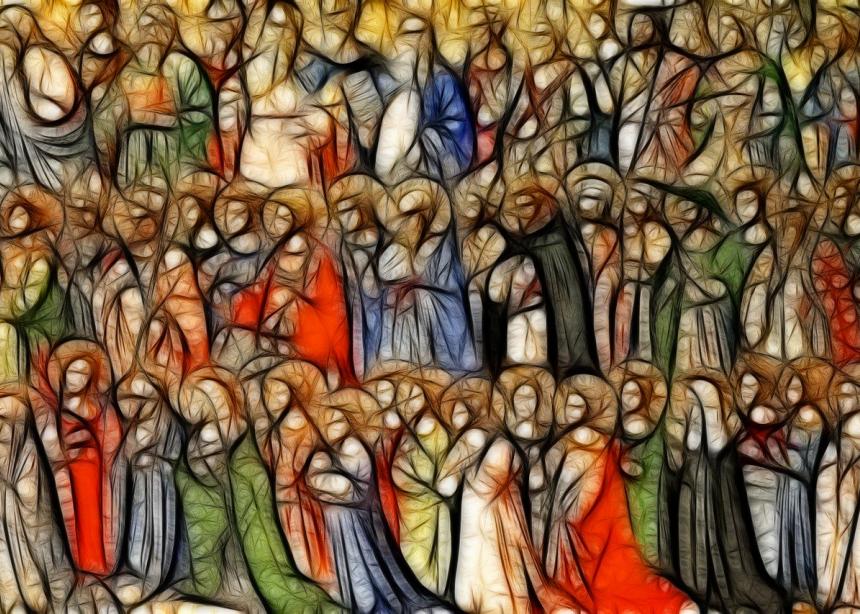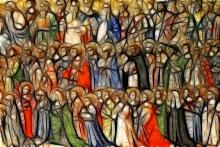“Where are you, Mennonites?”
A colleague and I are in a Winnipeg café discussing the current land struggles of many Indigenous peoples. I listen intently as she speaks of the Unist’ot’en, Muskrat Falls and the Tiny House Warriors. I nod my head in understanding and offer affirming murmurs. But then, halfway through tea, she looks at me impatiently.
“Where are you, Mennonites? You tell all these old martyr stories. And here we are—suffering and dying! Where are your martyrs now?”
I’m taken aback, not sure how to respond. I confess that the church often fails to join the poor and run the risks that they take. I share some of what we’re doing to address such, and where we need to go. She’s not buying it. Her eyes dismissively turn to a far window. A minute of silence goes by and then we head our separate ways.
As I bike to work, my mind relentlessly replays her lament, “Where are your martyrs now?” I’m tempted to defend and distance myself. Yet my heart feels the cry—for the Earth, the poor and even the church.
At my office, sitting in sweaty cycle gear, I stare at my work wall and pray. It’s plastered with pictures of martyrs and sayings of saints. My eyes hone in on one particular witness—a 42-year-old statement from the Asian Catholic Bishops: “As long as the ministers of the church are not prepared to be martyrs for justice, but are satisfied to live a life outside and above the life [of the oppressed], their impact will be mighty little.”
I take a deep breath and close my eyes.
Like many Mennonites, I hold close the 16th-century stories of Anabaptist suffering. Like many, I’m haunted all the more by the dangerous memory of the Cruciform One: “Take up the cross, and follow me.” Yet, am I willing, like Christ, to bear the weight of salvation?
Picking up my phone, I message Chris Huebner, a philosophy and theology prof at Canadian Mennonite University, who teaches classes on martyrdom. Not long after, we connect at a local bar and talk for two hours. As Chris shares, I learn that:
1. Exemplary witness, not death, is what matters. We can’t manufacture martyrs but we can choose to live costly lives.
2. There are martyrs among us. “If we believe,” says Chris, “the kinds of things that Christians traditionally believe about God and the church, that there will be martyrs is never a question. Who they are, and what they look like, is the hard part.” And yet, he continues, “If we believe what we say about Christ and the poor, then there’s no question that, in the Canadian context, the Indigenous story is full of martyrs.”
As I bike home that evening, my heart is grateful for rich conversation, and full with even more questions.
Lying in bed that night, I contemplate my friend’s impatient demand—“Where are you, Mennonites?”—and thank God for her troubling, holy question.
Steve Heinrichs is the director of Indigenous-Settler Relations for Mennonite Church Canada.
Read more From Our Leaders columns:
Freedom of speech for Christian media?
'Where there is no vision...'
I smile because I'm grateful
Speak Jesus
Just say 'hi'





Comments
is mr. heinrichs wanting mennonite martyrs to stand with the aboriginal folks who are in the boardrooms signing multi-million dollar contracts? it is confusing, because there are aboriginal players on trap lines, and in boardrooms. each pursuing an avenue of endeavor. i see aboriginal leaders struggling and seeking a good path forward, and we do not yet know what that will be.
in the meantime, activists who never have to make painful choices between common good and another common good, each in competition with the other, have the LUXURY or making idealistic pronouncements because no one is asking them, in wisdom, to seek a path forward.
in the meantime, muskrat falls or MB hydro is not the only injustice in Canada.
A call to martyrdom would mean a lot more if those making them weren't at the same time disregarding core teachings of the gospel, such as the need for "all people everywhere" to repent of their idolatry and turn to Jesus.
"Being then God’s offspring, we ought not to think that the divine being is like gold or silver or stone, an image formed by the art and imagination of man. The times of ignorance God overlooked, but now he commands all people everywhere to repent, because he has fixed a day on which he will judge the world in righteousness by a man whom he has appointed; and of this he has given assurance to all by raising him from the dead.” (Acts 17.29-31)
Our efforts to seek justice for others, and ourselves, need to be balanced with the hard truth of Jesus' coming judgment upon all nations. Otherwise we are simply helping them to 'gain the whole world' just to lose their very souls.
Steve Heinrichs (director of Indigenous/settler Relations for Mennonite Church Canada), relates a conversation with a colleague regarding a variety of issues and contentions surrounding Indigenous land claims. In evident frustration, the colleague queries of Steve, "Where are you Mennonites? ... Where are your martyrs now?"
Steve seems flummoxed by the questions. It seems he knows that historically, Anabaptist (even Mennonite) martyrs have existed. The walls of his office at work are "plastered with pictures of martyrs and sayings of saints," presumably some of them are of Anabaptist vintage as found in the Martyrs Mirror (Thieleman J. van Bracht 1660). "Plastered" denotes that there must have been many martyrs in those days, van Bracht's book attests to the numbers, and yet a good modern day martyr seems to be hard to find these days. As van Bracht contends, the impact of martyrdom is short lived. It would seem that the examples of martyrdom found in our Anabaptist history are specific to place and time, and can't be extrapolated or superimposed on Indigenous land rights issues. Perhaps they are best forgotten, having served their purposes for their day.
A more modern Mennonite approach would seem to be to teach classes about martyrdom. This would definitely be the safer approach. It would seem that if we are enlightened as to the perils of martyrdom, then we can sensibly avoid the pitfalls which seem to accompany such an endeavor. University classes on martyrdom would seem to be a good choice in that respect.
Ultimately, Steve recognizes that this paucity of Mennonite martyrs is rooted in the poverty of Mennonite Church Canada leadership. Steve submits a quote from an Asian Catholic Bishops conference (1977?) which says, "As long as the ministers of the church are not prepared to be martyrs for justice, ... their impact will be mighty little." It seems evident that Mennonite Church Canada leadership is not issuing a call for martyrs, especially not martyrs for Indigenous land claims, which ultimately could exacerbate the festering wounds of Mennonite settler land issues too.
It would seem the time for Mennonite martyrs has come and gone. The leadership is not putting out the call for martyrs. Mennonite Church Canada has done due diligence through missions, programs, charity, and modern technology to proclaim the good news of the gospel to individuals, groups, sects, and religions around the world. This is part of what Christians were tasked to do, and that message has been proclaimed the world over. The rest is in God's hands, no martyrs required any longer. Christ has been proclaimed.
It would seem that all that remains to be done, is to wait upon the Lord. I for one, am bunkered/hunkered down with the remaining 139,999, waiting. No martyrdom for me.
Thanks for now
Peter Reimer
Gretna, Manitoba
Add new comment
Canadian Mennonite invites comments and encourages constructive discussion about our content. Actual full names (first and last) are required. Comments are moderated and may be edited. They will not appear online until approved and will be posted during business hours. Some comments may be reproduced in print.